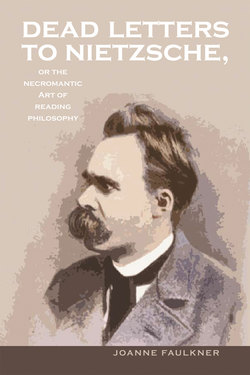Dead Letters to Nietzsche, or the Necromantic Art of Reading Philosophy

Реклама. ООО «ЛитРес», ИНН: 7719571260.
Оглавление
Joanne Faulkner. Dead Letters to Nietzsche, or the Necromantic Art of Reading Philosophy
Отрывок из книги
Series in Continental Thought
Editorial Board
.....
This adds a different inflection, and another degree of complexity, to Nietzsche’s genealogical narrative. For if the noble is a product of the slave’s guilt—a retroactive projection from the point of view of the victim who imagines herself as the aggressor—then the genealogy must be read in reverse, or even as circular, rather than as a lineage beginning with the master and ending with the Übermensch. It is at this point, then, that we can begin to tease out a second order narrative from Nietzsche’s text: a fairy tale whose monsters arise from the fantasies of good, Christian folk. Arguably the most interesting section of Genealogy is also its most oblique. The second essay describes the condition of socialization of the human, who would have to become “calculable, regular, necessary, even in his own image of himself, if he is to be able to stand security for his own future” (58): in order, that is, to have the right to make promises. Nietzsche’s variation on the theme of the social contract, therefore, demonstrates what must have occurred before we were able to make a contract in the first place. We must have had to install a sense of the other’s well-being into ourselves at the expense of our own “free” expression of power, and this is exacted at the level of corporeality, according to Nietzsche: whereby the body is forced to work against itself, in what must have necessitated an extremely painful and protracted process of shaping the individual as a more or less exchangeable type within the social economy. “‘If something is to stay in the memory it must be burned in: only that which never ceases to hurt stays in the memory’—this is a main clause of the oldest (unhappily also the most enduring) psychology on earth.” (61) Only in the context of a social economy of sameness could the notion of guilt arise, according to Nietzsche, out of the concept of debt (the German for both guilt and debt is Schuld) (62–63). Punishment thus consists in the creditor’s right to extract from the debtor’s body the pleasure of freely discharging one’s power at the expense of another. The nature of the economy is that all are exchangeable, and the juridical system regulates this principle by converting masters into slaves and slaves into masters, in what Nietzsche calls a “carnival of cruelty” (65).[19]
In order to become a social animal—and thus a regular participant in the economy of the social contract—the master has had to renounce its own stake in life as will to power: that is, the enactment of jouissance upon the other’s body. For the wielding of force has come to be regulated by the law rather than by individuals, and the master is thus equally subject to law as the slave. This is where we find the subject returning to its bodily depth: for this enjoyment through the infliction of pain upon the other is redeployed to become the very impetus of social behavior. Enjoyment is reconfigured as bad conscience, wherein the persecutor takes her or himself as the object of cruelty. In bad conscience, “will to power” turns in upon itself—makes itself its own victim—in order to practice a cruelty that is not only socially permissible, but also necessary to the formation of the subject. When frustrated, enjoyment that would have been thrust outwardly, and so immediately dissipated, is stored up to create an interior reservoir of pleasure. Accordingly, abstinence also becomes a manner of (ascetic) pleasure, in the realm of sexuality as well as violence: “there is no necessary antithesis between chastity and sensuality; every good marriage, every genuine love affair, transcends this antithesis” (98). Both cruelty and sensuality are allowed to ripen and gather force by means of abstinence. When placed in these terms, it is difficult to imagine a being with the requisite power for greatness in a period historically or ontologically “prior” to the slave moral revolt. The conditions for the body “becoming what it is” are prepared by slave morality; that is, by the body’s subjection—and active participation in such subjection—to language.
.....